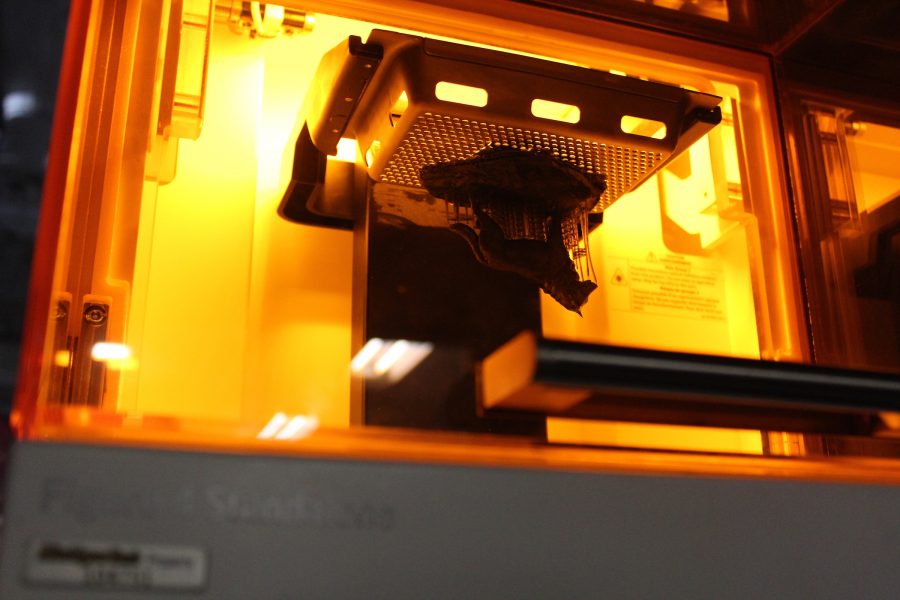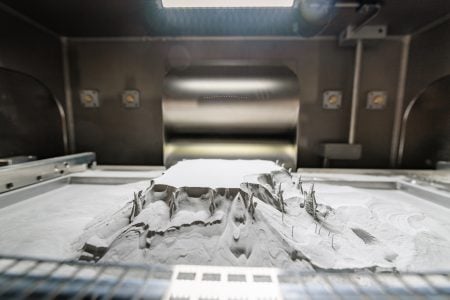
Michigan Tech’s production-style, polymeric additive manufacturing (AM) machines are all located in the MMET Machine Shop. MMET Department Chair John Irwin envisions a total of seven.
“In accordance with ASTM, all AM processes must fall into one of seven technology groups,” Irwin explains. “For optimum teaching and research, it’s become increasingly clear that we need seven types of printers, one for each different technology.”
“The first of the three machines in our MMET AM Lab is a Stratasys Fortus 400mc 3D prototyping machine with wash station, used for Fused Deposition Modeling (FDM). The second machine, for Vat Photopolymerisation—more commonly known as stereolithography—uses the 3D Systems Figure 4 Standalone Industrial 3D Printer. Finally, Material Jetting is done using the MJP 3600 with the PRO JET Finisher.”
Both undergraduate and graduate students stand to benefit from added equipment, says Irwin. “The MMET Machine Shop already serves as an important campus resource, serving both the MMET department and numerous other departments on campus.”
“Several undergraduate MMET labs are held in the Machine Shop,” notes Irwin. “A number of undergraduate Enterprise teams use the facility, as well.”
In addition, MMET graduate students use the Machine Shop as a place of learning. “Our Manufacturing Engineering MS degree course, MFGE 5300, covers the seven AM processes, how they work to produce a part, and how to design a part for the additive process,” says Irwin. “A second course, MFGE 5400, is a lab-based class in which students will bring their newly acquired knowledge from MFGE 5300 and apply it to designing and producing parts on each type of technology.”
“One of our most important goals is to become a leader in manufacturing, teaching and research. To reach this goal, our AM Lab is continually evolving.”
A great deal of research goes on in the Machine Shop, too. “Graduate research projects are produced in this space on a daily basis for many disciplines across campus,” says Irwin. “Access to the best technology ensures the best research results. It also saves time, and in many cases, money, to the researcher—meaning they will be able to do more with their budget.”
Fortunately, the MMET AM Lab is ready for growth. MMET Master Machinist Scott Meneguzzo and Operations/Facilities Supervisor Nicholas Hendrickson staff the Machine Shop full-time, along with help as needed from temporary employees.
“Nicholas has operated the polymeric AM facility since 2013,” notes Irwin. “He has developed a billing structure to account for time and materials for AM projects, and recently completed training in order to operate and maintain Michigan Tech’s new Direct Metal Printer.” Hendrickson is also pursuing a PhD in Mechanical Engineering with a research focus in AM.
Last, but not least, printer material for AM is a critical need. “Each of the seven AM printing technologies is capable of printing a range of different material types. We need to have all these materials on hand,” says Irwin. “We also need example parts—produced from each material from each machine—so that a researcher can hold in their hand, feel and see each option in order to select the best printer and material for their project.”
“For the very same reasons, example parts are also important for educating students,” says Irwin.

Michigan Tech Opens New Metal AM Facility
Adjacent to the Machine Shop, room 117 houses Michigan Tech’s new 3D Systems Direct Metal Printer (DMP), and the Flex 350 Production Printer. “This type of AM is for the manufacturing of high-precision metal parts with the 3D systems approved powders,” says Irwin. “This unit has a resolution of five microns and can process 11 unique metals, including bio-grade titanium (for biomedical applications), cobalt and chromium, several types of stainless steel, and more. “It’s available for research and development using custom powders, too.”
Read more
Alumni Gift of Advanced 3D Metal Printer Now Up and Running at Michigan Tech